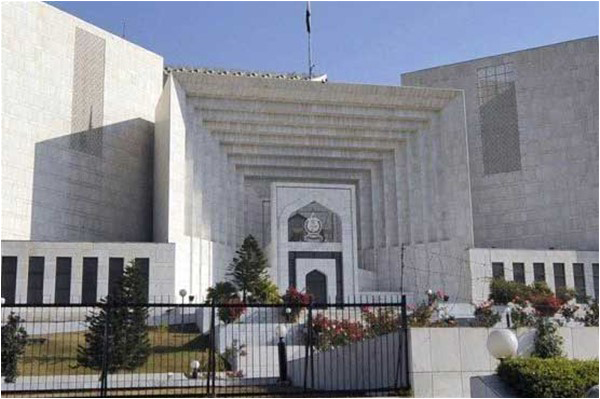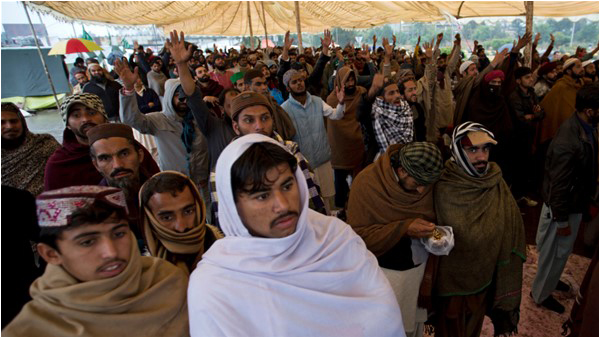
Do more!
Sir,
The review petition against the “Panama judgment” disqualifying the prime minister was rejected by the honourable Supreme Court. For me, a lawyer, the judgments, failed to do justice to our legal system and its true beneficiaries, the people of Pakistan. My personal feelings apart, I believe that the Sharifs should be grateful to the SC for not using all the powers it has. For had that been done there would most certainly have been immediate custody for them though not for anything alleged against them in the pleadings but rather for their conduct during the hearings.
Their lordships expressed a complete lack of faith in the agencies of state and decided that false evidence had been presented before them.
They stated inter alia: “We thus … would not let everything go into the hands of the cronies and collaborators for being taken to a dead end. … as this Court under Article 184(3) of the Constitution has the power to issue a direction if and when a person performing functions in connection with the affairs of the federation does not do what he is required by law to do.”
The court has appointed a supervising judge and placed a six-month limit for the case’s conclusion.
The conditions speak volumes of the malaise within the system. When the SC itself can no longer be certain that its orders will be obeyed without hands-on day-to-day supervision what of the people?
If our courts are to function effectively then they must devise a method that automatically ensures that matters are taken to their logical conclusion. No legal system can survive or be effective if the judges themselves have to supervise and implement their decisions.

Having worked within the British legal system and the Pakistani one I have been struck by how a slight difference in attitude can make a difference. Pakistani judges are no less intelligent, trained, equipped or remunerated than their British counterparts. The laws and procedures at the disposal of Pakistani courts are, if anything, more far-reaching than those available to the UK courts. A comparison of a few cases would serve to demonstrate the huge difference in output.
We find that it is the honourable court itself that has failed to use its full powers, which has emboldened cronies and collaborators. As their Lordships have demonstrated in the Panama case, they have vast powers to order all institutions to do what the law requires or refrain from what the law prohibits. Contempt is a widely defined offence. However, there can be no clearer form of the offence than that where a direct order is disobeyed. More importantly, though criminal in nature, the matter is heard and decided summarily or within weeks if the court so chooses. When we compare the use of this weapon it becomes apparent why it has become necessary for their lordships to personally supervise matters.
In the cases of Joseph Baird and Kasim Davey, two jurors in different cases, had been warned against using the internet in relation to the cases they were trying. They disobeyed. Each was given two months in jail. If we contrast them with Yusuf Raza Gilani’s case we find a sitting prime minister disobeying an order of the Supreme Court. He was sentenced to a few minutes of confinement within the courtroom with no costs no fine either. If the honourable courts had used their contempt powers and kept in mind the necessity of the sentence to reflect deterrence against future transgressions, this case was tailormade because the nation eyes king and pauper alike.
A sentence of say at least six months, along with costs, would have sent alarm bells ringing through all ranks. In the present case, their lordships would have been in a position to sit back and let the sentence do the persuading.
As to the findings of the presentation of false evidence, in England Lord Archer was accused by The Star of having relations with a sex worker. He was a best-selling novelist and deputy chairman in Thatcher’s all-powerful governing Conservative Party. This made him one of the richest and most influential men in the UK. He sued the newspaper for defamation. He was awarded colossal damages by a jury in 1987 because he produced an alibi witness who gave a statement that Archer was with him at the time. Fourteen years later the alibi witness went to the police and told them that Archer had asked him to fabricate the evidence. There was a trial in which both Archer and the false witness were charged. Archer was convicted by a jury of perjury and perverting the course of justice. He was sentenced to four years with a stipulation that he serve at least two years inside prison. Archer was left with compensation and costs for the billing of The Star totaling 2.1 million pounds. His own bills took his liability to over four million pounds.
Jonathan Aitken was the Chief secretary to the Treasury again in a Tory government. In 1995 The Guardian alleged he accepted hospitality from the Saudis. They paid for flights and a stay at the Ritz. Aitkin sued for defamation. The trial collapsed when the paper obtained evidence showing that Aitken had fabricated an alibi through his wife. He was sent to prison for 18 months and ordered to pay costs. He couldn’t pay so he was made bankrupt. His wife left him and he lost everything.
When we contrast the UK perjury and contempt cases with the Panama case, their Lordships in the Supreme Court found in the Panama case that false evidence and false documents were presented. Much was made of it all and little was done about it. No costs, no penalties and of course no prison sentences.
As far back as 1983, the Law and Justice Commission of Pakistan submitted a report on ‘Elimination of False Evidence From The Judicial System in Pakistan’. I would respectfully submit that the difference in output comes from the fact that it is instilled in British judges that the powers they have are held on trust for the masses and the use of those powers within legal parameters is their duty and not an option. Having found someone guilty of perjury they must sentence them to imprisonment so that a message is sent out that the law and the courts will not be trifled with. Imagine if all those found guilty of presenting false evidence or documents had been sentenced as Lord Archer was.
The reluctance of the Pakistani courts to utilize their full powers was reaffirmed in a more recent case (HCJD/C-121 W.P. No. 308 of 2016. Malik Bashir Ahmed, etc. versus The Federal Government of Pakistan, through Secretary Cabinet Division, Islamabad.) In his judgment, Justice Athar Minallah of the Islamabad High Court found inter alia that the Federal Government Employees Housing Foundation, a company set up to provide housing for a public purpose, had no right to make compulsory acquisition of lands within the ICT. The fact that they had been doing so for nearly 30 years was no reason to perpetuate the injustice.
Justice Minallah referred to French economist Frederic Bastiat: “When plunder becomes a way of life for a group of men in a society, over the course of time they create for themselves a legal system that authorizes it and a moral code that glorifies it.” He added: “But how is this legal plunder to be identified? Quite simply. See if the law takes from some persons what belongs to them and gives it to other persons to whom it does not belong. See if the law benefits one citizen at the expense of another by doing what the citizen himself cannot do without committing a crime”.
The honourable court made inter alia the following findings: “The Foundation has collected substantial funds despite the pending petitions. It is beyond comprehension how the Foundation sent offer letters and collects instalments when the matter was subjudice.
“Sale or disposition of land vested in and owned by the government in a non-transparent manner attracts the offence of corruption and corrupt practice as defined in section 9 of the National Accountability Bureau Ordinance 1999.
“The Executive Committee of the Foundation selects the … beneficiaries and … respective quota. The beneficiaries are serving or retired officers and employees of federal ministries..., judges of the superior courts i.e. the Hon’ble Supreme Court, all the High Courts, ...and the Federal Shariat Court… journalists, media workers, lawyers, employees of ministries and constitutional bodies, … which essentially is in violation of the principles of transparency.
“The Judges of the District Courts of Islamabad Capital Territory, who would ultimately hear and decide references of the affectees … have either already availed the benefit or have applied for a plot to the Foundation, thus resulting in them having a personal financial interest … The entire machinery involved in the acquisition of land through the police force of the State, from the Chief Commissioner to the Land Acquisition Collector, have a financial interest in the Foundation i.e. to get a plot at a price lower than what it would fetch through a transparent sale.
“Journalists and media workers, who are supposed to hold the State organs accountable by exposing their misdeeds to the people of Pakistan, have also been made stakeholders. Likewise, lawyers who should defend the affectees and highlight their grievances relating to violations of their fundamental rights are also a part of this State largesse. Interestingly, none of the members of these categories have a vested right to obtain land in a non-transparent manner. Such an extraordinary privilege is not part of the terms and conditions of a federal government servant or any other employee who is a member of the Foundation. The State has no commitment to give a plot in a non-transparent manner to the judges, journalists, lawyers or any other beneficiary of the Foundation.”
Such a damning indictment of captured and capturers alike is rare at least within the Pakistani system. The judgment has been hailed by Barrister Babar Sattar in an article headed “Daylight robbery” in The News (October 28) as “extraordinary”. I too have gone public to express similar sentiments but with the caveat: where are the sentences? the costs and punishments? For without sanction, retribution, recovery and correction, the judgment, though providing partial relief to the party, will do nothing for the rule of law and principle.
Barrister SA Khan,
Islamabad.
Aviation Industry
Sir,
This is in reference to a statement by Prime Minister Shahid Khaqan Abbasi that PIA must be privatized. While it is correct that it is not the business of the state to do business, it remains its responsibility to ensure that the rights of consumers are not compromised at the altar of greed and profit.
In the US and Europe, the state maintains strict regulatory controls with penalties on private airlines by independent agencies such as the FAA, ensuring that they comply with ICAO safety regulations and aircraft meet airworthiness requirements. These airlines must also have the financial capacity through insurance to pay compensation in case of fatal air crashes.
The track record of private Pakistani airlines such as Bhoja, Shaheen, Air Blue etc is poor in this context—they have yet to pay compensation even though years have passed.
Strict Civil Aviation regulatory controls do not exist in Southeast Asia, Africa, and the Far East etc. As far as regional airlines such as Emirates, Etihad, Qatar Airlines,Turkish Airlines are concerned they are all owned and subsidized by their states. The problem with PIA is political interference in choice of management, leasing of aircraft, procurement of essential aircraft spares, appointment of GSA etc and surrendering over 65% of ethnic traffic to Gulf-based airlines.

Under Nur Khan, PIA flourished and expanded in terms of fleet, routes and frequency of flights because of good management. Over the years CAA Pakistan and PIA have become a dumping ground for retired officers and political cronies. Routes and slots acquired over years are being deliberately tampered with. Suspension of routes also leads to cash flow problems. What PIA needs is to curtail its operating cost and submit to the laws of supply and demand, by providing direct flights from northern hubs where 80% of traffic originates and eliminates the burden of positioning aircraft.
Appointment of incompetent cronies to head key stations such as New York, London, Manchester etc has resulted in a decline in revenue. What else can be expected if PIA is forced to appoint a Manager Passport to New York instead of an experienced marketing officer?
T. Ali,
Lahore.
Inspired by #MeToo
Sir,
Following the public outcry against Hollywood’s mogul and sexual predator Harvey Weinstein, numerous women have been inspired by “Me Too” to publicly state their individual experiences of gender discrimination and harassment. A lot of water has flowed under the bridge from the days when women did not have the right to vote and were considered game for uninvited sexual predatory advances.
Dozens of showbiz professionals have come out to name and shame their predators in the US where a consensual relationship between adults is not a crime. They were encouraged because an actress had the courage to name Harvey Weinstein, considered a czar in Hollywood. The public outcry forced the establishment to take him to task. As they say, the fish rots from the head down.

Change and reformation only take place when those holding powerful office come under public scrutiny. Compare this to our shameful handling of the Dr Shazia Khalid rape and the role of the then president of this Islamic country. No religion, including Islam, tolerates harassment of women.
Those holding public office are required to conform to a higher code of ethics than that applicable to ordinary citizens because decisions they take impact the lives of millions. Former head of CIA Gen (retd) Petraeus was forced to resign when it was discovered that he had a consensual relationship with a subordinate officer. We turned a blind eye to the lifestyle of Yahya Khan. Incidences such as those of model Ayyan Ali are a matter of shame for all politicians, just like the corruption charges are against Nawaz Sharif, Asif Zardari and Pervez Musharraf.
Institution building, accountability and enforcement of discipline go hand in hand.
Aneela Chandio,
Sukkur.

Interior minister?
Sir,
After waiting to see if an amicable solution developed for over a week, I now look to our interior minister to make a humble request to end the sufferings of the people of Islamabad and Rawalpindi. Students, the elderly and people who commute from other cities have been held hostage by the protesters who decided to hold a sit-in at Faizabad interchange. This could be taken as a good example of a “state within a state” within the jurisdiction of the federal government. I request the federal minister of interior to sort out the issue as soon as possible.
Advocate Khalid Mustafa,
Islamabad.

